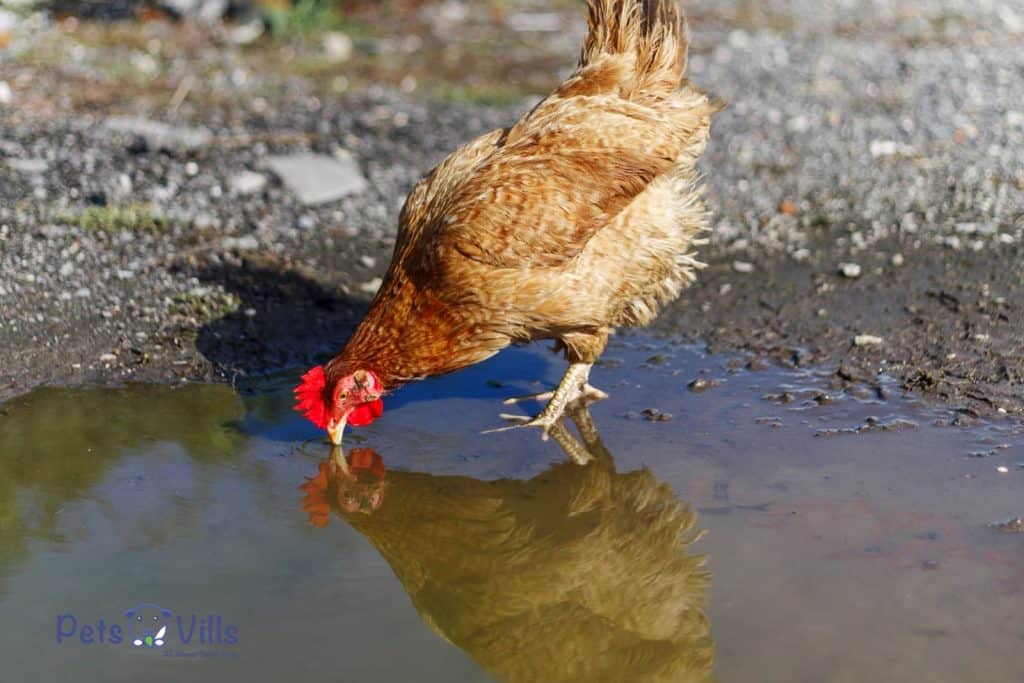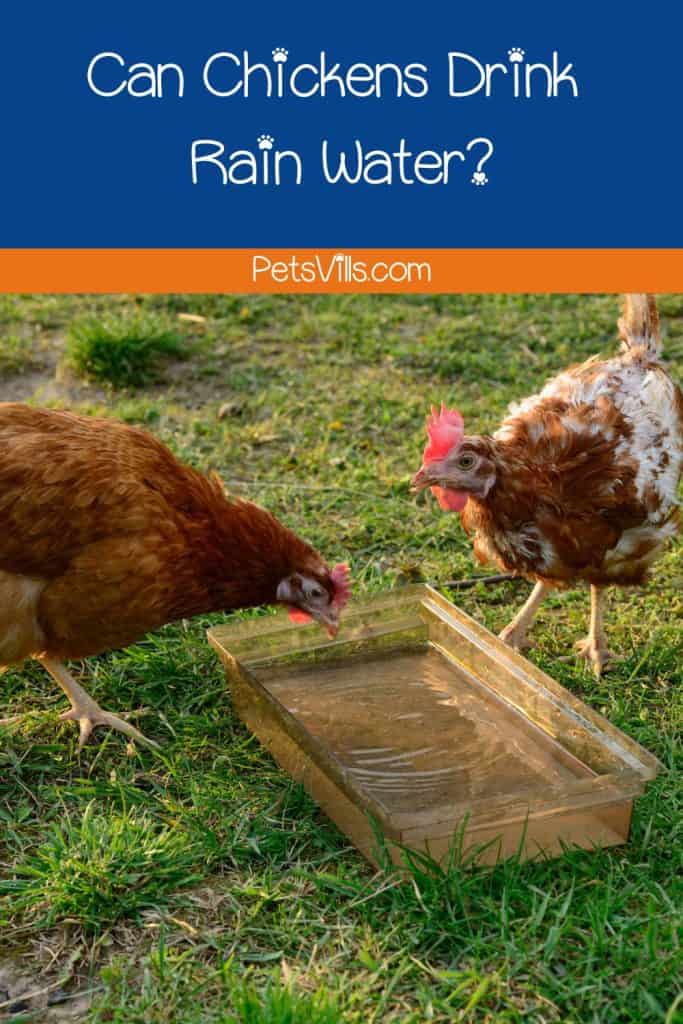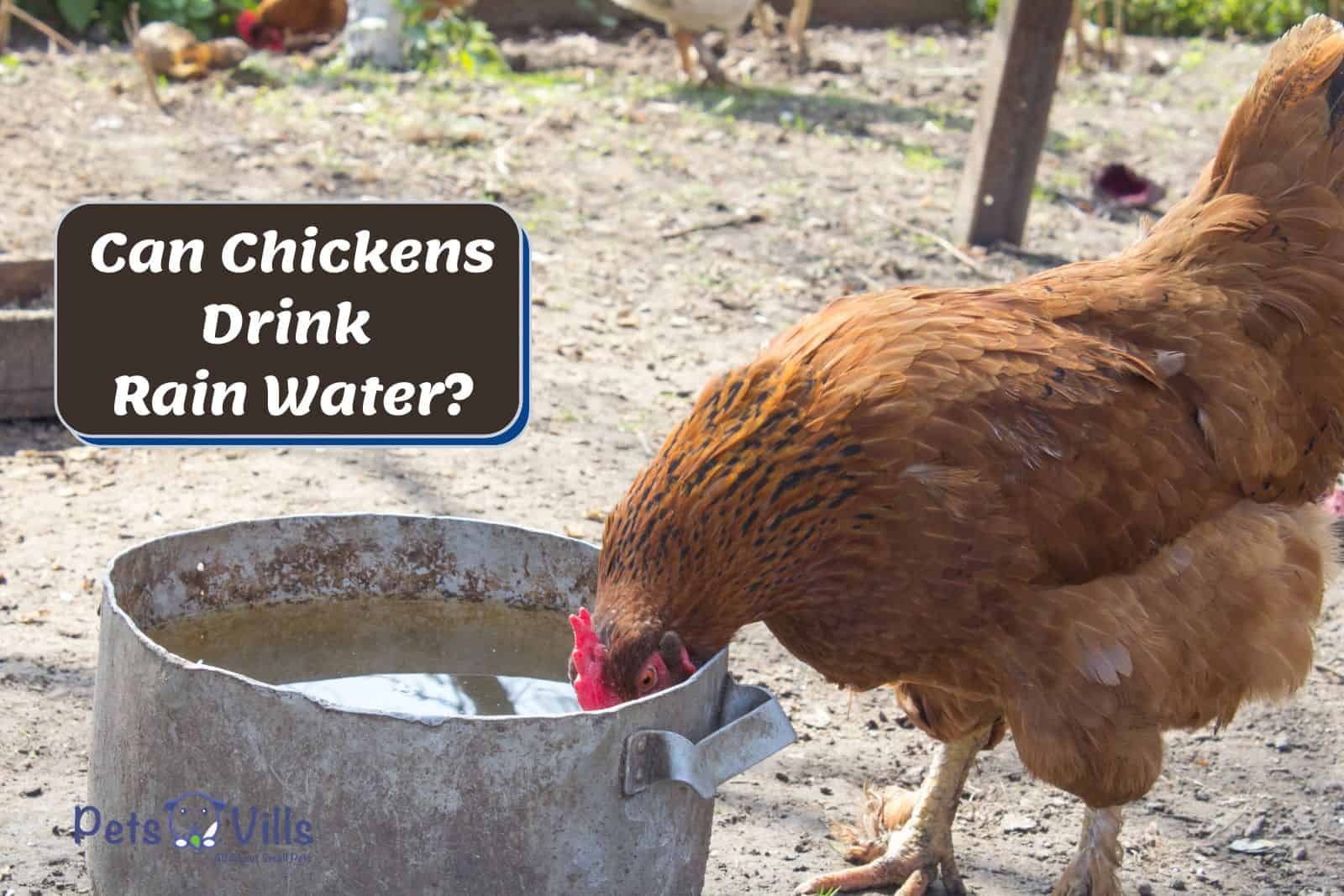When it comes to rain water, there are a lot of different opinions on whether it’s safe or not for chickens.
So, can chickens drink rain water? Yes, chickens can drink rain water because it doesn’t contain harmful chemicals or substances so they can drink as much as they want without having health issues.
Continue reading to learn more about chickens drinking rain water, how much water they need, and how you can collect rain water for chickens,
Table of Contents
Key Takeaways:
- Rainwater is safe for chickens as long as it is clean.
- Chickens can drink tap water, too.
- You can collect rain water with rain barrels or by catching the water from the downspout of a metal or plastic roof in a bucket or barrel.
Can Chickens Drink Rain Water?
Rain water is safe for chickens to drink. It’s not just chickens that can drink rain water, but most other animals, too.

Chickens have lived for thousands of years and have evolved to survive off water from rain. Therefore, it’s safe if your chickens are drinking rainwater from puddles or buckets.
Just make sure that the water is clean and it’s not infested with mosquitoes and other parasites.
Some people prefer to let their chickens drink rainwater for a couple of reasons:
- It’s natural so it won’t contain any harmful chemicals.
- It doesn’t cost anything to provide rainwater to chickens.
- It’s plentiful during the spring and summer months.
Can Chickens Drink Tap Water
Yes, it is safe for chickens (and humans) to drink tap water. In most towns and cities, tap water usually goes through a filtration process before it reaches your home.
Sometimes, depending on where you live, tap water is not treated and may need to be boiled first. If so, the city in which you live will have a notice instructing you to do so.
Otherwise, the water straight from your faucet is perfectly fine for chickens to drink.
Don’t miss out on our informative articles on “Can chickens drown in the rain” and “Why did my chicken lay a tiny egg“. Click on the links to learn more about these interesting topics!
Collecting Rainwater For Chickens
Collecting rain water for sustainable use, such as for watering your garden or supplying it to your flock of chickens, is an earth-friendly permaculture concept. (1)
When Permaculturist Will Hooker thinks of how to apply permaculture to the collection of rain in his own yard, he says, “It’s an umbrella of thinking that deals with all aspects of living.” (1)
If you want to do something similar with water in your yard for supplying water to your chickens, there are a couple of methods for collecting rain water.
One of them is using a bucket and placing it under a downspout or runoff area of the chicken coop’s roof.
If you using this bucket method, make sure the coop roof is made of tin or plastic. House roofing is usually shingles and these contain all kinds of harmful chemicals.
When rain water is running off of shingles, the chemicals might leach into the water.
Another method is to use a rain barrel for collection. Simply put out a barrel or two and leave them outside to collect rain. Barrels come in different materials and colors.
You should use a plastic barrel that’s either blue or black. Avoid clear/translucent barrels as they could promote algae growth in the water.
When you need to give your chickens water, simply use a cup and scoop it from the barrel into their water bowl.
If you’re busy, you can install automatic chicken drinker cups at the bottom of your barrel.
When the chickens want to drink, they’ll peck on the cup and fresh water will come out from the barrel for them.
When using a barrel to collect rain, it can sometimes become a problem. Since barrels are usually large and hold a lot of water, it makes an excellent breeding ground for mosquitoes.
One of the ways to prevent mosquitoes from breeding is to keep the cover on the rain barrel when it’s not in use.
During the rainy season, you can place a mosquito net over the opening of the barrel. This should prevent mosquitoes, debris, leaves, and branches from getting into the water.
The third method is to build a rain barrel system for the chicken coop. This process involves using a gutter on the coop to collect the water and letting it run into a barrel.
From there, the chickens can drink water directly from the barrel as long as you have installed automatic chicken drinker cups.
If you’re handy and want to build one yourself with step-by-step instructions, check out Building a Rainwater Chicken Waterer. (2)
I also suggest watching this video to get a visual for making and using a rain water chicken waterer.
Water Containments
Collected rain is clean and safe for chickens to drink for a day or so. The water will become stagnant after sitting for a long time and will no longer be fresh. (3)
Stagnant water is a great breeding ground for mosquitoes and other parasites. During the summer, leaving the water out for a couple of hours or more may lead to parasite infestation.
At night, it can be worse. Mosquitoes are nocturnal and come out at night to feed and breed.
Therefore, if you have any water left over overnight, discard it and fill it with fresh water the next day.
As for puddles, chickens are usually smart enough not to drink from them if they seem murky.
However, it’s best to cover muddy puddles so you won’t risk the chance of them drinking from one and getting infected by parasites.
How Much Water Does a Chicken Drink in a Day?
How much water a chicken needs to drink depends on several factors.
Some of the factors include what season it is if your hens are laying eggs and the age of your chickens.
The first factor is the seasons of the year. During the spring and summer, when there’s hot weather, chickens will need to drink a lot of water to keep themselves hydrated.
Also, when the weather is warm, chickens tend to be more active. They will spend most of their days foraging for food.
During the fall and winter months, the weather gets colder. During this time, chickens are less active and spend most of their time in the coop. Therefore, they will drink less water.
The second factor is egg-laying hens. During this time, hens need a lot of water to stay hydrated. Laying eggs put a lot of stress on their bodies.
The third one is the age of the chicken. Young chicks don’t require a lot of water due to their size. Adult chickens require more water to keep them hydrated.
Frequently Asked Questions
1. Can chickens drink water with algae in it?
Chickens should not drink from a water source with algae in it because they can get sick from the toxins algae produces.
2. How do you filter rain water for chickens?

You don’t need to filter rain water for chickens as long as it is clean water that’s collected properly and not stored for long. Stagnant water breeds mosquitoes and parasites.
3. Why do you put apple cider vinegar in chicken water?
Anecdotal information shows that apple cider vinegar provides probiotics to chickens thus benefitting their digestion. It can also prevent algae from growing in the water.
Conclusion
Chickens need plenty of water each day to remain healthy. Water is what keeps their body systems functioning properly.
So, the answer to your question, “Can chickens drink rain water?” is yes. Rainwater is not that different from tap water and filtered water.
It’s safe and great for keeping chickens hydrated, especially during the summer months. It is also an easy and sustainable option.

References:
1. Ammons Rumbley J. Will Hooker and Jeana Myers’ Urban Permaculture [Internet]. WALTER Magazine. 2020. Available from: https://waltermagazine.com/home/will-hooker-garden/
2. Masterson S. Building a Rainwater chicken waterer [Internet]. The Intrepid Homestead. 2017 [cited 2023 Jan 20]. Available from: https://intrepidhomestead.com/2017/08/16/building-a-rainwater-chicken-waterer/
3. Falconer IR, Dornbusch M, Moran G, Yeung SK. Effect of the cyanobacterial (blue-green algal) toxins from Microcystis aeruginosa on isolated enterocytes from the chicken small intestine. Toxicon. 1992; 30:790–3.
Alina Hartley is a small-town girl with a ginormous love of bearded dragons. It all started with Winchester, a baby bearded who was abandoned at the shelter by his former owners because of a birth defect that caused one front leg to be shorter than the other. Alina originally went to the shelter looking for a guinea pig, but one look at Winchester and it was love at first sight. From that day on, Alina has dedicated her life to learning everything she can about bearded dragons. She loves helping new beardie parents start their incredible journey with these magnificent reptiles.
Follow her on:
LINKEDIN
TWITTER.
Read her latest articles HERE
Learn more about her HERE.


